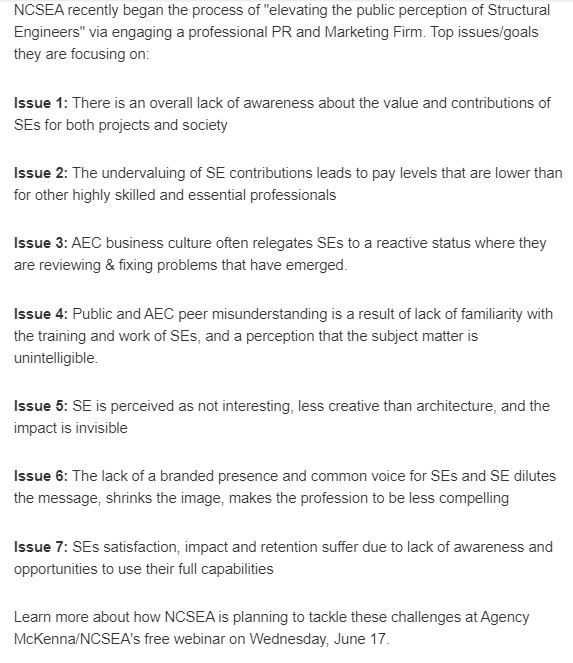LockeBT
Structural
- May 9, 2021
- 55
Just had a conversation with my sister who’s a dentist. Surprisingly (not?) I learned that the Dental Boards are incredibly powerful and influential. They are heavily involved in politics and lobbying. It’s to protect their pay (one of the highest in all professions) and continue their prestigious professional status.
Which got me thinking about our Board. Simply put, we’re comically outdated. It’s not a realization that I have to dig deep for either.
-In an age of specialists we’re still lumped with all the other engineering disciplines, surveyors and architects. Heck, even within the Civil Engineering umbrella it’s already distinctive between structural, geotechnical, civil, environmental, etc...
-This is the board that still allows Architects to design 1-2 story residential buildings (there are limitations but still, shouldn’t be there to begin with). It waters down our technical skills. Such a dumb move because it sends off the sentiment that we’re not that specialized since someone else can do it. Even a portion of it. I get that Architects used to be the jack-of-all-trades but that was about 70 years ago. That’s how I know the board is full of archaic old timers with outdated thinking.
-There’s no protection for our pay. In the private sector you’re pretty much competing with each other. There’s always an engineer lowballing their service fees and ends up getting the job. In order to remain competitive other firms follow suit and the fees drop altogether.
-The values of the licenses are completely incoherent and inconsistent. To be competitive as a Civil Engineer or Structural Engineer you MUST have your licenses. The same can’t be said about MEs or EEs. It’s an optional bonus for them rather than baseline.
I don’t mean to come off unprofessional and ranty but it’s a sad reality we need to address for our profession. The board needs to break up. It needs an overhaul. There should be one residing over each discipline (I would go as far as saying there should be one for the structural engineers only). Not all lumped together because we “share fundamentals”. Doctors, pharmacists and dentists share massive chemistry and biology fundamentals too and they all have their own board.
Which got me thinking about our Board. Simply put, we’re comically outdated. It’s not a realization that I have to dig deep for either.
-In an age of specialists we’re still lumped with all the other engineering disciplines, surveyors and architects. Heck, even within the Civil Engineering umbrella it’s already distinctive between structural, geotechnical, civil, environmental, etc...
-This is the board that still allows Architects to design 1-2 story residential buildings (there are limitations but still, shouldn’t be there to begin with). It waters down our technical skills. Such a dumb move because it sends off the sentiment that we’re not that specialized since someone else can do it. Even a portion of it. I get that Architects used to be the jack-of-all-trades but that was about 70 years ago. That’s how I know the board is full of archaic old timers with outdated thinking.
-There’s no protection for our pay. In the private sector you’re pretty much competing with each other. There’s always an engineer lowballing their service fees and ends up getting the job. In order to remain competitive other firms follow suit and the fees drop altogether.
-The values of the licenses are completely incoherent and inconsistent. To be competitive as a Civil Engineer or Structural Engineer you MUST have your licenses. The same can’t be said about MEs or EEs. It’s an optional bonus for them rather than baseline.
I don’t mean to come off unprofessional and ranty but it’s a sad reality we need to address for our profession. The board needs to break up. It needs an overhaul. There should be one residing over each discipline (I would go as far as saying there should be one for the structural engineers only). Not all lumped together because we “share fundamentals”. Doctors, pharmacists and dentists share massive chemistry and biology fundamentals too and they all have their own board.

